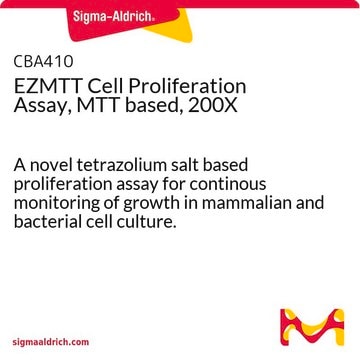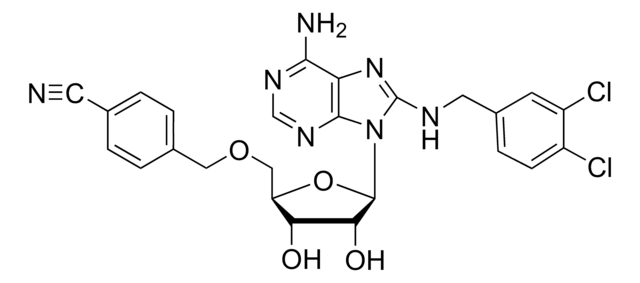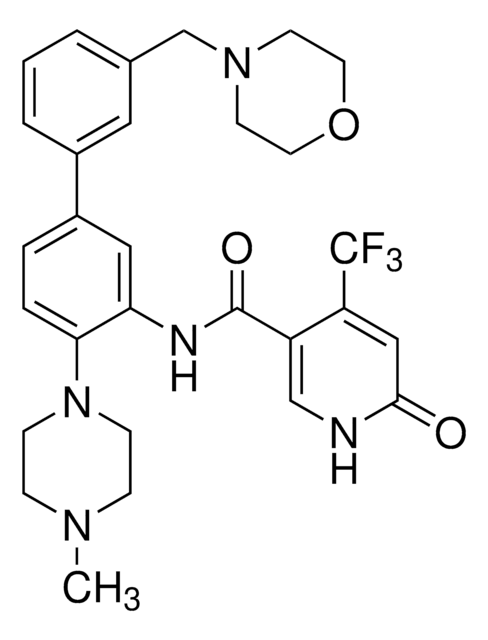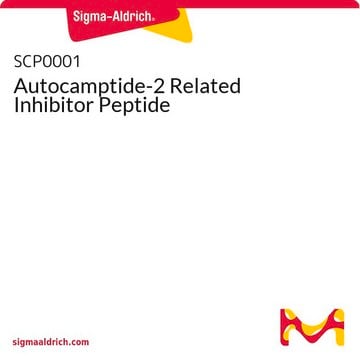SML3584
AZ1
≥98% (HPLC)
Synonym(s):
2-[[[5-Bromo-2-[[4-fluoro-3-(trifluoromethyl)phenyl]methoxy]phenyl]methyl]amino]-ethanol, AZ 1, AZ-1
Sign Into View Organizational & Contract Pricing
All Photos(1)
About This Item
Empirical Formula (Hill Notation):
C17H16BrF4NO2
CAS Number:
Molecular Weight:
422.21
MDL number:
UNSPSC Code:
12352200
NACRES:
NA.21
Recommended Products
Quality Level
Assay
≥98% (HPLC)
form
powder
color
white to beige
solubility
DMSO: 2 mg/mL, clear
storage temp.
2-8°C
SMILES string
FC1=CC=C(COC2=CC=C(C=C2CNCCO)Br)C=C1C(F)(F)F
Biochem/physiol Actions
AZ1 is a potent and selective dual USP25 & USP28 deubiquitinase (DUBs) inhibitor (USP25/28 IC50 = 0.62/0.7 nM by Ub-Rh110 assay) that induces HCT116 cellular c-Myc degradation (20-100 µM for 3h or 60 µM for 0.3-3h). AZ1 exhibits antiproliferation activity in cancer cultures (IC50 ≤20 µM; HCT116, HT29 and SW480) and anti-tumor efficacy in an orthotopic model of lung SCC tumours in mice in vivo (125 mg/kg or 375 mg/kg i.p. once every three days, 6 injections total).
Storage Class Code
11 - Combustible Solids
WGK
WGK 3
Flash Point(F)
Not applicable
Flash Point(C)
Not applicable
Certificates of Analysis (COA)
Search for Certificates of Analysis (COA) by entering the products Lot/Batch Number. Lot and Batch Numbers can be found on a product’s label following the words ‘Lot’ or ‘Batch’.
Already Own This Product?
Find documentation for the products that you have recently purchased in the Document Library.
USP28 enables oncogenic transformation of respiratory cells, and its inhibition potentiates molecular therapy targeting mutant EGFR, BRAF and PI3K
Molecular Oncology, 16, 3082-3106 (2022)
Maintaining protein stability of ?Np63 via USP28 is required by squamous cancer cells
Cristian Prieto-Garcia, Oliver Hartmann, Michaela Reissland, Fabian Braun, Thomas Fischer
EMBO Molecular Medicine, 12 (2022)
Inhibition of USP28 overcomes Cisplatin-resistance of squamous tumors by suppression of the Fanconi anemia pathway
Cell Death and Differentiation, 29, 568-584 (2022)
The deubiquitinase USP25 supports colonic inflammation and bacterial infection and promotes colorectal cancer
Nature cancer, 1, 811-825 (2020)
Deubiquitylase USP25 prevents degradation of BCR-ABL protein and ensures proliferation of Ph-positive leukemia cells
Oncogene, 39, 3867-3878 (2020)
Our team of scientists has experience in all areas of research including Life Science, Material Science, Chemical Synthesis, Chromatography, Analytical and many others.
Contact Technical Service








